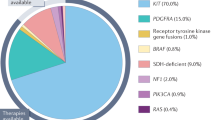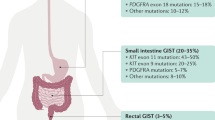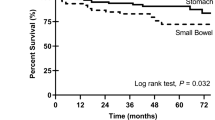Abstract
Tyrosine kinase inhibitors that target the key molecular drivers of gastrointestinal stromal tumour (GIST) are effective treatments of advanced-stage GIST. Yet, most of these patients succumb to the disease. Approximately 60% of patients with GIST are cured by surgery, and these individuals can be identified by risk stratification schemes based on tumour size, mitosis count and site, and assessment of rupture. Two large randomized trials have evaluated imatinib as adjuvant treatment for operable, KIT-positive GIST; adjuvant imatinib substantially improved time to recurrence. One of these trials reported that 3 years of adjuvant imatinib improves overall survival of patients who have a high estimated risk for recurrence of GIST compared with 1 year of imatinib. The optimal adjuvant strategy remains unknown and some patients might benefit from longer than 3 years of imatinib treatment. However, a strategy that involves GIST risk assessment following surgery using a validated scheme, administration of adjuvant imatinib for 3 years, patient monitoring during and after completion of imatinib to detect recurrence early, and reinstitution of imatinib if GIST recurs is a reasonable choice for care of patients with high-risk GIST.
Key Points
-
The currently available risk stratification schemes are reasonably accurate at predicting the risk of gastrointestinal stromal tumour (GIST) recurrence and helpful for identifying patients who are likely to be cured by surgery
-
Adjuvant imatinib improves recurrence-free survival of patients who have undergone surgery for GIST and who have a substantial risk of recurrence
-
In a randomized phase III trial, adjuvant imatinib administered for 3 years after surgery improved recurrence-free survival and overall survival compared with 1 year of administration
-
An adjuvant strategy that involves follow up with imaging and early reinstitution of tyrosine kinase inhibitor therapy if GIST recurs may be important for achieving optimal survival outcomes
-
Special subgroups, such as GISTs with a gene mutation that renders the tumour insensitive to imatinib, need to be identified when patients are considered for systemic adjuvant therapy
This is a preview of subscription content, access via your institution
Access options
Subscribe to this journal
Receive 12 print issues and online access
$209.00 per year
only $17.42 per issue
Buy this article
- Purchase on Springer Link
- Instant access to full article PDF
Prices may be subject to local taxes which are calculated during checkout

Similar content being viewed by others
References
Mucciarini, C. et al. Incidence and clinicopathologic features of gastrointestinal stromal tumors. A population-based study. BMC Cancer 7, 230 (2007).
Nilsson, B. et al. Gastrointestinal stromal tumors: the incidence, prevalence, clinical course, and prognostication in the preimatinib mesylate era—a population-based study in western Sweden. Cancer 103, 821–829 (2005).
Joensuu, H. et al. Risk of gastrointestinal stromal tumour recurrence after surgery: an analysis based on pooled population-based cohorts. Lancet Oncol. 13, 265–274 (2012).
DeMatteo, R. P. et al. Two hundred gastrointestinal stromal tumors: recurrence patterns and prognostic factors for survival. Ann. Surg. 231, 51–58 (2000).
Corless, C. L., Barnett, C. M. & Heinrich, M. C. Gastrointestinal stromal tumours: origin and molecular oncology. Nat. Rev. Cancer 11, 865–878 (2011).
Andersson, J. et al. NF1-associated gastrointestinal stromal tumors have unique clinical, phenotypic, and genotypic characteristics. Am. J. Surg. Pathol. 29, 1170–1176 (2005).
Carney, J. A. Gastric stromal sarcoma, pulmonary chondroma, and extra-adrenal paraganglioma (Carney triad): natural history, adrenocortical component, and possible familial occurrence. Mayo Clin. Proc. 6, 543–552 (1999).
Miettinen, M., Wang, Z. F. & Lasota, J. DOG1 antibody in the differential diagnosis of gastrointestinal stromal tumors: a study of 1840 cases. Am. J. Surg. Pathol. 33, 1401–1408 (2009).
Novelli, M. et al. DOG1 and CD117 are the antibodies of choice in the diagnosis of gastrointestinal stromal tumours. Histopathology 57, 259–270 (2010).
Heinrich, M. C. et al. PDGFRA activating mutations in gastrointestinal stromal tumors. Science 299, 708–710 (2003).
Hirota, S. et al. Gain-of-function mutations of platelet-derived growth factor receptor alpha inhibitors in murine gastrointestinal stromal tumors. Gastroenterology 125, 660–667 (2003).
Pacini, S. et al. Clinical and molecular genetics of patients with the Carney-Stratakis syndrome and germline mutations of the genes coding for the succinate dehydrogenase subunits SDHB, SDHC, and SDHD. Eur. J. Hum. Genet. 16, 79–88 (2008).
Agram, N. P. et al. Novel V600E BRAF mutations in imatinib-naive and imatinib-resistant gastrointestinal stromal tumors. Genes Chromosomes Cancer 10, 853–859 (2008).
Woodall, C. E. et al. An evaluation of 2537 gastrointestinal stromal tumors for a proposed clinical staging system. Arch. Surg. 144, 670–678 (2009).
Emile, J. F. et al. Frequencies of KIT and PDGFRA mutations in the MolecGIST prospective population-based study differ from those of advanced GISTs. Mol. Oncol. http://dx.doi.org/10.1007/s12032-011-0074-y.
Casali, P. G. & Blay, J.-Y. Gastrointestinal stromal tumours: ESMO Clinical Practice Guidelines for diagnosis, treatment and follow-up. Ann. Oncol. 21 (Suppl.), v98–v102 (2010).
National Comprehensive Cancer Network. NCCN Clinical Practice Guidelines in Oncology. Soft tissue sarcoma. Version 1.2012 [online], (2012).
Demetri, G. D. et al. Efficacy and safety of imatinib mesylate in advanced gastrointestinal stromal tumors. N. Engl. J. Med. 347, 472–480 (2002).
Blanke, C. D. et al. Long-term results from a randomized phase II trial of standard- versus higher-dose imatinib mesylate for patients with unresectable or metastatic gastrointestinal stromal tumors expressing KIT. J. Clin. Oncol. 26, 620–625 (2008).
Verweij, J. et al. Progression-free survival in gastrointestinal stromal tumours with high-dose imatinib: randomised trial. Lancet 364, 1127–1134 (2004).
Blanke, C. D. et al. Phase III randomized, intergroup trial assessing imatinib mesylate at two dose levels in patients with unresectable or metastatic gastrointestinal stromal tumors expressing the kit receptor tyrosine kinase: S0033. J. Clin. Oncol. 26, 626–632 (2008).
Heinrich, M. C. et al. Molecular correlates of imatinib resistance in gastrointestinal stromal tumors. J. Clin. Oncol. 24, 4764–4774 (2006).
Hislop, J. et al. Systematic review of escalated imatinib doses compared with sunitinib or best supportive care, for the treatment of people with unresectable/metastatic gastrointestinal stromal tumours whose disease has progressed on the standard imatinib dose. J. Gastrointest. Cancer http://dx.doi.org/10.1007/s12029-011-9325-6.
Demetri, G. D. et al. Efficacy and safety of sunitinib in patients with advanced gastrointestinal stromal tumour after failure of imatinib: a randomised controlled trial. Lancet 368, 1329–1338 (2006).
Crosby, J. A. et al. Malignant gastrointestinal stromal tumors of the small intestine: a review of 50 cases from a prospective database. Ann. Surg. Oncol. 8, 50–59 (2001).
DeMatteo, R. P. et al. Tumor mitotic rate, size, and location independently predict recurrence after resection of primary gastrointestinal stromal tumor (GIST). Cancer 112, 608–615 (2008).
Miettinen, M., Sobin, L. H. & Lasota, J. Gastrointestinal stromal tumors of the stomach. A clinicopathologic, immunohistochemical, and molecular genetic study of 1765 cases with long-term follow-up. Am. J. Surg. Pathol. 29, 52–68 (2005).
Miettinen, M., Makhlouf, H., Sobin, L. H. & Lasota, J. Gastrointestinal stromal tumors of the jejunum and ileum. A clinopathologic, immunohistochemical, and molecular genetic study of 906 cases before imatinib with long-term-follow-up. Am. J. Surg. Pathol. 30, 477–489 (2006).
Rutkowski, P. et al. Risk criteria and prognostic factors for predicting recurrences after resection of primary gastrointestinal stromal tumor. Ann. Surg. Oncol. 14, 2018–2027 (2007).
Takahashi, T. et al. An enhanced risk-group stratification system for more practical prognostication of clinically malignant gastrointestinal stromal tumors. Int. J. Clin. Oncol. 12, 369–374 (2007).
Tryggvason, G., Gislason, H., Magnusson, M. K. & Jonasson, J. G. Gastrointestinal stromal tumors in Iceland, 1990–2003: The Icelandic GIST study, a population based incidence and pathologic risk stratification study. Int. J. Cancer 117, 289–293 (2005).
Steigen, S. E., Eide, T. J., Wasag, B., Lasota, J. & Miettinen, M. Mutations in gastrointestinal stromal tumors—a population-based study from Northern Norway. APMIS 115, 289–298 (2007).
Mazzola, P. et al. Epidemiology and molecular biology of gastrointestinal stromal tumors (GISTs): a population-based study in the South of Switzerland, 1999–2005. Histol. Histopathol. 23, 1379–1386 (2008).
Braconi, C. et al. KIT and PDGFRα mutations in 104 patients with gastrointestinal stromal tumors (GISTs): a population-based study. Ann. Oncol. 19, 706–710 (2008).
Brabec, P. et al. A whole population study of gastrointestinal stromal tumors in the Czech Republic and Slovakia. Neoplasma 56, 459–464 (2009).
Fletcher, C. D. et al. Diagnosis of gastrointestinal stromal tumors: A consensus approach. Hum. Pathol. 33, 459–465 (2002).
Miettinen, M. & Lasota, J. Gastrointestinal stromal tumors: pathology and prognosis at different sites. Semin. Diagn. Pathol. 23, 70–83 (2006).
Joensuu, H. Risk stratification of patients diagnosed with gastrointestinal stromal tumor. Hum. Pathol. 39, 1411–1419 (2008).
Gold, J. S. et al. Development and validation of a prognostic nomogram for recurrence-free survival after complete surgical resection of localised primary gastrointestinal stromal tumour: a retrospective analysis. Lancet Oncol. 10, 1045–1052 (2009).
Rossi, S. et al. Natural history of imatinib-naive GISTs: a retrospective analysis of 929 cases with long-term follow-up and development of a survival nomogram based on mitotic index and size as continuous variables. Am. J. Surg. Pathol. 35, 1646–1656 (2011).
Miettinen, M. et al. Gastrointestinal stromal tumors, intramural leiomyomas, and leiomyosarcomas in the duodenum: a clinicopathologic, immunohistochemical, and molecular genetic study of 167 cases. Am. J. Surg. Pathol. 27, 625–641 (2003).
Miettinen, M. et al. Gastrointestinal stromal tumors, intramural leiomyomas, and leiomyosarcomas in the rectum and anus: a clinicopathologic, immunohistochemical, and molecular genetic study of 144 cases. Am. J. Surg. Pathol. 25, 1121–1133 (2001).
Rutkowski, P. et al. Validation of the Joensuu risk criteria for primary resectable gastrointestinal stromal tumour - the impact of tumour rupture on patient outcomes. Eur. J. Surg. Oncol. 37, 890–896 (2011).
Hohenberger, P. et al. Pattern of recurrence in patients with ruptured primary gastrointestinal stromal tumour. Br. J. Surg. 97, 1854–1859 (2010).
Joensuu, H. Predicting recurrence-free survival after surgery for GIST. Lancet Oncol. 10, 1025 (2009).
Wardelmann, E. et al. Deletion of Trp-557 and Lys-558 in the juxtamembrane domain of the c-kit protooncogene is associated with metastatic behavior of gastrointestinal stromal tumors. Int. J. Cancer 106, 887–895 (2003).
Martin, J. et al. Deletions affecting codons 557–558 of the c-KIT gene indicate a poor prognosis in patients with completely resected gastrointestinal stromal tumors: a study by the Spanish Group for Sarcoma Research (GEIS). J. Clin. Oncol. 23, 6190–6198 (2005).
DeMatteo, R. P. et al. Adjuvant imatinib mesylate after resection of localised, primary gastrointestinal stromal tumour: a randomised, double-blind, placebo-controlled trial. Lancet 373, 1097–1104 (2009).
Joensuu, H. et al. One versus three years of adjuvant imatinib for operable gastrointestinal stromal tumor: a randomized trial. JAMA 307, 1265–1272 (2012).
DeMatteo, R. P. et al. Efficacy of adjuvant imatinib mesylate following complete resection of localized, primary gastrointestinal stromal tumor (GIST) at high risk of recurrence: the U. S. Intergroup phase II trial ACOSOG Z9000 [abstract]. ASCO Gastrointestinal Cancers Symp. a8 (2008).
Kang, B. et al. A phase II study of imatinib mesylate as adjuvant treatment for curatively resected high-risk localized gastrointestinal stromal tumors [abstract]. J. Clin. Oncol. 27 (Suppl.), e21515 (2009).
Kanda, T. et al. Adjuvant therapy with imatinib mesylate after resection of primary high-risk gastrointestinal stromal tumors in Japanese patients. Int. J. Clin. Oncol. http://dx.doi.org/10.1007/s10147-011-0339-7.
Zhan, W. H. Efficacy and safety of adjuvant post-surgical therapy with imatinib in patients with high risk of relapsing GIST [abstract]. J. Clin. Oncol. 25 (Suppl. 18), a10045 (2007).
Nilsson, B. et al. Adjuvant imatinib treatment improves recurrence-free survival in patients with high-risk gastrointestinal stromal tumours (GIST). Br. J. Cancer 96, 1656–1658 (2007).
Li, J., Gong, J. F., Wu, A. W. & Shen, L. Post-operative imatinib in patients with intermediate or high risk gastrointestinal stromal tumor. Eur. J. Surg. Oncol. 37, 319–324 (2011).
Jiang, W.-Z. et al. Adjuvant imatinib treatment after R0 resection for patients with high-risk gastrointestinal stromal tumors: a median follow-up of 44 months. J. Surg. Oncol. 104, 760–764 (2011).
Huang, H. et al. Surgical outcomes of gastrointestinal stromal tumors of the stomach: a single unit experience in the era of targeted drug therapy. Med. Oncol. http://dx.doi.org/10.1007/s12032-011-9888-x.
US National Library of Medicine. ClinicalTrials.gov [online], (2009).
Wang, D. et al. Phase II trial of neoadjuvant/adjuvant imatinib mesylate for advanced primary and metastatic/recurrent operable gastrointestinal stromal tumors: long-term follow-up results of Radiation Therapy Oncology Group 0132. Ann. Surg. Oncol. 19, 1074–1080 (2012).
McAuliffe, J. C. et al. A randomized, phase II study of preoperative plus postoperative imatinib in GIST: evidence of rapid radiographic response and temporal induction of tumor cell apoptosis. Ann. Surg. Oncol. 16, 910–919 (2009).
Blesius, A. et al. Neoadjuvant imatinib in patients with locally advanced non metastatic GIST in the prospective BRF 14 trial. BMC Cancer 11, 72 (2011).
Hohenberger, P. et al. Neoadjuvant imatinib and organ preservation in locally advanced gastrointestinal stromal tumors (GIST) [abstract]. J. Clin. Oncol. 27 (Suppl. 15), a10550 (2009).
Andtbacka, R. H. I. et al. Surgical resection of gastrointestinal stromal tumors after treatment with imatinib. Ann. Surg. Oncol. 14, 14–24 (2007).
Eisenberg, B. L. & Trent, J. C. Adjuvant and neoadjuvant imatinib therapy: current role in the management of gastrointestinal stromal tumors. Int. J. Cancer 129, 2533–2542 (2011).
Reichardt, P. et al. Response to imatinib rechallenge of GIST that recurs following completion of adjuvant imatinib treatment – the first analysis in the SSGXVIII/AIO trial patient population [abstract]. Eur. J. Cancer 47 (Suppl. 2), 15 (2011).
Le Cesne, A. et al. Discontinuation of imatinib in patients with advanced gastrointestinal stromal tumours after 3 years of treatment: an open-label multicentre randomised phase 3 trial. Lancet Oncol. 11, 942–949 (2010).
Von Mehren, M. et al. Follow-up results after 9 years of the ongoing, phase II B2222 trial of imatinib mesylate in patients with metastatic or unresectable KIT+ gastrointestinal stromal tumors (GIST) [abstract]. J. Clin. Oncol. 29 (Suppl.), a10016 (2011).
Blesius, A. Who are the long responders to imatinib (IM) in patients with advanced GIST? Results of the BRF14 prospective French Sarcoma Group randomized phase III trial. J. Clin. Oncol. 29, (Suppl.) 616s (2011).
Davies, H. E., Wathen, C. G. & Gleeson, F. V. The risks of radiation exposure related to diagnostic imaging and how to minimise them. BMJ 342, d947 (2011).
Corless C. et al. Relation of tumor pathologic and molecular features to outcome after surgical resection of localized primary gastrointestinal stromal tumor (GIST): results of the intergroup phase III trial ACOSOG Z9001 [abstract]. J. Clin. Oncol. 28 (Suppl.), a10006 (2010).
Heinrich, M. C. et al. Kinase mutations and imatinib response in patients with metastatic gastrointestinal stromal tumor. J. Clin. Oncol. 21, 4342–4349 (2003).
Debiec-Rychter, M. et al. EORTC Soft Tissue and Bone Sarcoma Group; Italian Sarcoma Group; Australasian GastroIntestinal Trials Group. KIT mutations and dose selection for imatinib in patients with advanced gastrointestinal stromal tumours. Eur. J. Cancer 42, 1093–1103 (2006).
Miettinen, M. & Lasota, J. Gastrointestinal stromal tumors: review on morphology, molecular pathology, prognosis, and differential diagnosis. Arch. Pathol. Lab. Med. 130, 1466–1478 (2006).
Mussi, C. et al. Therapeutic consequences from molecular biology for gastrointestinal stromal tumor patients affected by neurofibromatosis type 1. Clin. Cancer Res. 14, 4550–4555 (2008).
Bardsley, M. R. et al. Kitlow stem cells cause resistance to Kit/platelet-derived growth factor alpha inhibitors in murine gastrointestinal stromal tumors. Gastroenterology 139, 942–952 (2010).
Heinrich, M. C. Imatinib treatment of metastatic GIST: don't stop (believing). Lancet Oncol. 11, 911–912 (2010).
Joensuu, H. et al. Vatalanib for metastatic gastrointestinal stromal tumour (GIST) resistant to imatinib: final results of a phase II study. Br. J. Cancer 104, 1686–1690 (2011).
Le Cesne, A. et al. Phase II study of oral masitinib mesilate in imatinib-naive patients with locally advanced or metastatic gastro-intestinal stromal tumour (GIST). Eur. J. Cancer 46, 1344–1351 (2010).
Reichardt, P. et al. Phase III study of nilotinib versus best supportive care with or without a TKI in patients with gastrointestinal stromal tumors resistant to or intolerant of imatinib and sunitinib. Ann. Oncol. http://dx.doi.org/10.1093/annonc/mdr598.
Park, S. H. et al. Sorafenib in patients with metastatic gastrointestinal stromal tumors who failed two or more prior tyrosine kinase inhibitors: a phase II study of Korean gastrointestinal stromal tumors study group. Invest. New Drugs http://dx.doi.org/10.1007/s10637-012-9795-9.
George, S. et al. A multicenter phase II study of regorafenib in patients with advanced gastrointestinal stromal tumor after therapy with imatinib and sunitinib [abstract]. J. Clin. Oncol. 29 (Suppl.), a10007 (2011).
Demetri, G. D. Differential properties of current tyrosine kinase inhibitors in gastrointestinal stromal tumors. Semin. Oncol. 38 (Suppl. 1), S10–S19 (2011).
Author information
Authors and Affiliations
Ethics declarations
Competing interests
The author declares that he acts as a consultant for and receives honoraria and grant support from Novartis.
Supplementary information
Supplementary Table 1
Cohort studies addressing adjuvant imatinib and studies addressing preoperative imatinib for GIST (DOC 64 kb)
Rights and permissions
About this article
Cite this article
Joensuu, H. Adjuvant treatment of GIST: patient selection and treatment strategies. Nat Rev Clin Oncol 9, 351–358 (2012). https://doi.org/10.1038/nrclinonc.2012.74
Published:
Issue Date:
DOI: https://doi.org/10.1038/nrclinonc.2012.74
This article is cited by
-
Delayed adjuvant imatinib in patients with high risk of recurrence of gastrointestinal stromal tumor after radical surgery: a retrospective cohort study
Journal of Cancer Research and Clinical Oncology (2022)
-
Cost-utility analysis of adjuvant imatinib treatment in patients with high risk of recurrence after gastrointestinal stromal tumour (GIST) resection in Thailand
Cost Effectiveness and Resource Allocation (2019)
-
Revisiting NTRKs as an emerging oncogene in hematological malignancies
Leukemia (2019)
-
Adjuvant imatinib for patients with high-risk gastrointestinal stromal tumors: a retrospective cohort study
Scientific Reports (2017)
-
Treatment patterns, efficacy and toxicity of regorafenib in gastrointestinal stromal tumour patients
Scientific Reports (2017)



